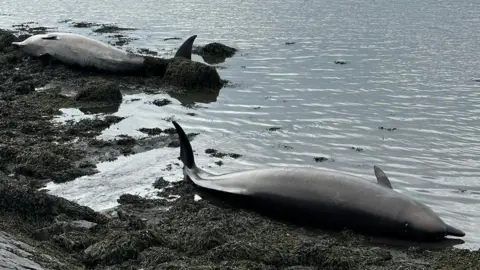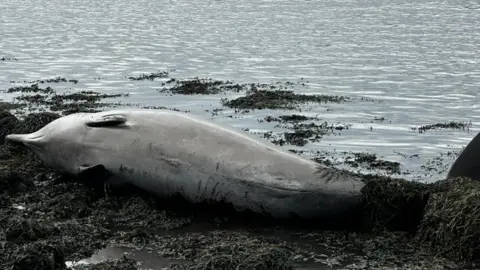Experts to examine why whales died on Fife beach
 BBC
BBCPost-mortem examinations are taking place after two whales which stranded off the east coast of Scotland died.
The Northern bottlenose whales were beached on the shoreline near Culross, Fife, on Tuesday evening.
British Divers Marine Life Rescue (BDMLR) and the South Queensferry coastguard rescue team attended but one whale died at 06:00 BST yesterday and the other at 14:00.
It is hoped the post-mortem will help explain why they became beached.
Dr Andrew Brownlaw, from the Scottish Marine Animal Stranding Society will be carrying out the examinations.
He said that there were some similarities between this stranding and the mass stranding that happened on a Western Isles Beach two weeks ago.

He told BBC's Good Morning Scotland radio programme: "The Lewis event was long-finned pilot whales these are two Northern bottlenose whales. They're both a deep-diving species and them being seen from the coast of Scotland is relatively unusual."
"Either something has pulled them in, they were following prey, or something has pushed them from their normal habitat into these waters."
Northern bottlenose whales are most commonly found in the North Atlantic Ocean although they have been known to wash up on beaches across the Baltic Sea.
Dr Brownlaw said it was unusual that their prey - squid - would be in such shallow water, although it can happen.
Tragic
His team will also be investigating if predators pushed the whales further inland or whether it was underwater noise caused by shipping, military activity or oil and gas extraction.
"Even if it's totally healthy at the point in which it comes on the beach, being left high and dry out of the water will eventually kill it," he said.
"They're not evolved to be able to support their own body weight so when they're lying on the beach they actually begin to crush their own tissues. It's pretty tragic actually."
